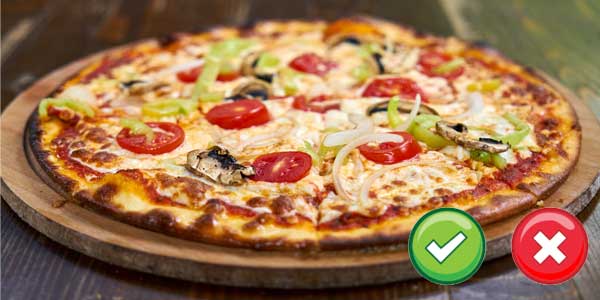When you regularly suffer with gout, every meal choice becomes a careful negotiation. For those with a soft spot for pizza, the conundrum is real. Is it possible to consume this popular dish without inviting a painful gout flare up?
This article delves into pizza with a specific focus on gout management. We'll sift through each element - the sauce, the cheese, the dough, and those tempting toppings - to discern their compatibility with a gout-conscious diet.
The truth isn't black and white: while pizza isn't inherently bad for gout, certain ingredients can be problematic. So, let's discover how you can potentially satisfy your pizza craving, without the aftermath of a gout flare-up.
Is Pizza Sauce OK for gout?
Tomatoes, the primary ingredient in pizza sauce, are naturally high in vitamin C and antioxidants, which are beneficial for gout sufferers. Tomatoes are also low in purines which means as a single ingredient they are not a bad food for gout sufferers.
The real issue lies in the hidden sugars and excessive salt often found in store-bought sauces. These ingredients can affect uric acid levels and blood pressure. This is not an ideal combo for gout management.
To keep the sauce on your slice, consider creating your own at home. A combination of fresh tomatoes, garlic, herbs like basil and thyme, and a drizzle of olive oil can create a gout-friendly sauce. By avoiding excessive salt and sugar, you can create a sauce that's both rich in flavour and low in gout-triggering compounds.
Does cheese aggravate gout?
When it comes to gout and cheese, your choice of this delicious topping matters.
One of the most popular and common cheeses found on pizza is mozzarella. Whilst this cheese is lower in purines than other cheeses such as cheddar, it still carries a significant amount of saturated fats, potentially affecting uric acid levels.
Gout doesn't require you to completely abandon cheese, but you should use in moderation. Also you can consider lower fat alternatives such as Ricotta, feta, and goat’s cheese.
If you're feeling adventurous, you could consider vegan cheeses. These options are free from animal proteins and can offer an enjoyable gout-friendly experience.
Is pizza dough bad for gout?
Standard pizza doughs are a simple mix, but white flour dough is a refined carbohydrate, which may contribute to increased insulin resistance. In turn, this has the potential to influence uric acid levels.
While it's not the worst ingredient to consume in a gout friendly diet, there's still room for improvement. Embracing whole grains is a step in the right direction, bringing more fibre and nutrients to the table.
Alternatively, innovative crusts made from ground almonds or cauliflower offer a lower-carb base, rich in anti-inflammatory benefits and less likely to provoke gout.
Different pizza toppings and their effect on gout
Toppings can make or break the 'gout-safety' of your pizza. When it comes to gout, not all toppings are created equal. High-purine offenders like seafood, pepperoni, sausage, and bacon are best left off the menu.
Vegetables are the real hero here, with options like spinach, kale, peppers, and mushrooms. These ingredients are not only safe, but beneficial due to their high nutrient density and low purine content.
For the meat lovers out there, stick to lean meat such as chicken. These are far better than the high purine options mentioned above.
Remember, choosing the right toppings can transform your pizza from a guilty pleasure into a healthy option, that respects the boundaries set by gout.
Conclusion
Piecing together the insights from each component, we see that a gout-friendly pizza is not a mythical dish.
The ideal pizza for those suffering with gout should feature the following:
- Home-made, low-sugar and salt sauce
- A crust made using whole grain or made from alternative ingredient such as cauliflower.
- Be sparingly topped with low-fat cheese or a plant-based substitute.
- Topped with a mosaic of colourful vegetables, perhaps accompanied by a lean protein.
It's all about making informed, smart choices that align with a diet aiming to keep gout at bay. So while moderation and mindfulness are key, there's no need to banish pizza entirely from your diet.
With these strategies, you can still occasionally indulge in a slice without fearing the wrath of a painful gout flare up.






